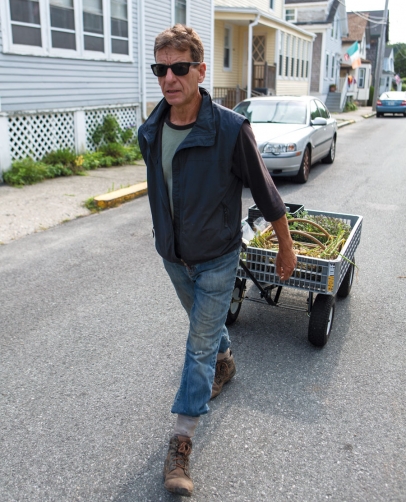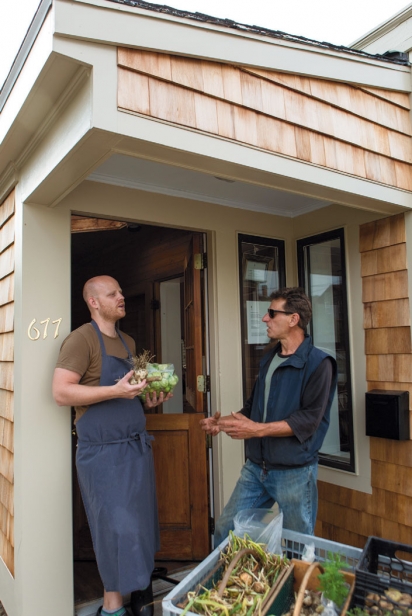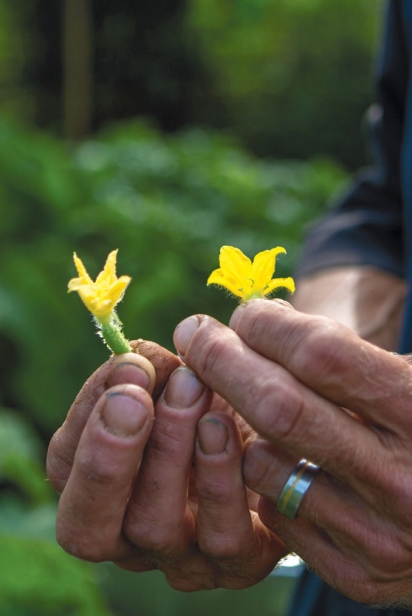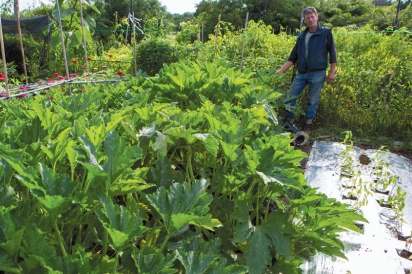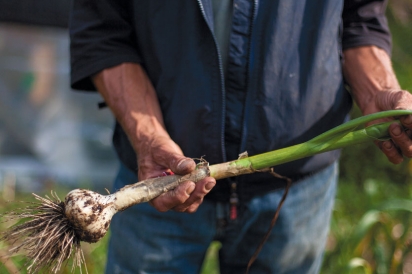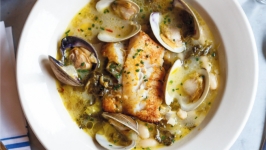Big Black Dog Farm Delivers Fresh Veggies by the Wagonload
With sun-stained, weather-beaten skin, fresh earth lodged under his fingernails and thick socks unfashionably hiked over his jeans to prevent ticks bites in the field, Jeff Stewart looks every inch the tenured farmer. You’d hardly expect that much of his yield is grown from an unassuming sustainable hoop house in his driveway tucked in Newport’s suburban Fifth Ward neighborhood.
“I was born here, and I never thought I’d be back,” he says with a laugh. The former globe-trotting businessman has lived in Brazil, Canada and New York City but it wasn’t until he settled in San Francisco with his now-wife, Sandy Bleich, that he explored more earthly pursuits.
“I kind of moved into ‘What am I going to do?’ mode, and I started to study urban gardening,” Stewart explains. “Then I knew I’d start a food business, something I would produce and create out of vegetables.”
Looking for land to indulge his growing passion, Stewart reached out to his sister and brother-in-law, Hedy and Paul Bennett in Middletown, who owned 16 bucolic acres, some overlooking the sea, to discuss starting a farm there. Soon the couple headed back East and after clearing and prepping acres that had been idle for more than two decades, they launched Big Black Dog Farm, named for their beloved black Lab, Abby.
Four years later, Stewart started to question if he had chosen the right path. “I wasn’t really doing it commercially and was kind of struggling with ‘What am I doing this for?’” he concedes. Perplexed with what to do with a yeoman’s bounty of garlic one season, a friend asked if he’d ever met Chef Jake Rojas of Tallulah on Thames in Newport, also known for his Tallulah’s Tacos.
“I met Jake in June about three years ago and he was totally passionate about local, and ‘Can you grow this?’ and ‘Can you grow that?’ And it really gave me this newfound …” he pauses, to find the right word, “… here was someone who I could connect with it.”
The two instantly bonded and Stewart was charged with growing items including cilantro, jalapeños, lettuces and garlic for the chef but it was Stewart’s growing experimentation with microgreens, various herb hybrids, edible flowers and lesser-known greens that truly cemented the pair.
Soon Stewart expanded his customer base to include Chefs Chad Hoffer and Tyler Burnley of both Thames Street Kitchen (TSK) and Mission, and later Chef Ted Gidley of the Clarke Cooke House, all in Newport. More recently, he’s added two retail customers: Le Petit Gourmet in Newport and Milk & Honey Bazaar in Tiverton.
“A lot of times I’m bringing them something they have never heard of, never seen,” says Stewart. “I’m doing the research to find it. My original passion was cooking. I was self-taught as a cook, totally driven by [the food]. … I buy seeds from around the world and find stuff that’s different. I buy seeds from Italy, from Europe, from Asia, from wherever—different stuff, and try to bring them to people and say ‘This is interesting,’ and they’ll say, ‘I have never heard of this. What the hell is it?’”
It could be micro red amaranth with crimson leaves and a flavor reminiscent of a beet, or perhaps lovage, an herb with a powerful celery taste, or maybe anise hyssop, a herb in the mint family Stewart describes as “smooth” and “mellow.”
“He’s nuts,” says Rojas, with a laugh. “We use the gamut: micro cilantro, fennel, basil, amaranth, mustard greens; a ton of edible flowers—nasturtiums, marigolds, Johnny Jump Ups. We communicate via text and email all day: ‘We need this, we need that.’ He’ll call us right from the farm.”
Rojas says it’s common practice for Stewart to stop by before nightly dinner service to deliver baby vegetables picked from the Middletown fields earlier that afternoon, in addition to the herbs and greens from the Fifth Ward hoop house. Some mornings, Stewart meets Rojas at the backyard garden he planted with the chef to teach him how to tend his own seedlings, herbs and greens.
“He’s helped us tremendously, in more ways than one. It’s more than just dropping off microgreens. It’s not always necessarily about the sale for Jeff, it’s … all about growing food. It’s a challenge, being able to grow food well and put it to use,” says Rojas. The farmer and the chef sit down a few times throughout the year and talk about what’s new in the micro world, what European growers are producing, and what lesser-known varieties might enhance Rojas’s flavor profiles, from his elegantly composed dishes to his casual taco cart “street style” menu for his taqueria in Providence.
“We don’t put microgreens on the plate to make to make the plate look pretty. They all have a specific reason.”
Just down the street, Stewart makes another daily stop, this time at TSK. “He’ll deliver four times a day if we need him to; it’s pretty great,” says Chef Chad Hoffer. “Everything he does, he does well. The good thing about microgreens is there are always new varieties and new hybrids of things, and Jeff is great at keeping track. He always seems to be little bit ahead of the curve.”
In one spring dish, Hoffer and his partner Burnley garnished beef carpaccio with some of Stewart’s sunflower shoots which delivered a nutty, lemony taste with a simultaneous subtle crunch. Stewart also introduced the chefs to cooking with marigolds and even sunchokes (also known as Jerusalem artichokes), a vegetable with a sweet but earthy flavor.
At Mission, a popular Newport burger joint the Thames Street Kitchen chefs own with brother-in-law Pat Downes and his wife, Ali, Stewart’s greens can be found atop their mouthwatering burgers and falafel.
“The greens change almost daily at Mission. It is really based on what Jeffrey has available,” says Hoffer. “Right now we are using radish and sunflower shoots. We have used a variety of head lettuces recently including Livigna, Lollo Rossa, Green Forest and Spetnak. He introduces us to stuff more often than not,” says Hoffer.
TSK also uses fresh cut flowers Stewart grows for the restaurant. He’s had a standing dinner reservation for two there every two weeks since the restaurant opened in 2011, which is how he initially got to know Hoffer, Burnley and the TSK team. Explains Hoffer, “By the following spring, we were pretty close and ready to rock.”
Stewart is adamant that he maintain a small footprint, and he means it. Many days his deliveries are done via a wagon he pulls from stop to stop. When he’s in a rush, he straps the day’s harvest to his moped and zips trough Newport’s narrow streets to meet his customer’s demands. The whole process—the hoop house in the driveway, the farm in the next town over, the elementary delivery methods and the relationships with the people who utilize his yield—it’s all a way for Stewart to be a part of the community and a part of the local movement, he says.
“My whole theme is to be literally local and own my relationship with my end user customer—the chef—and owning that, knowing him, knowing the people who I do business with. I don’t have any aspirations to, like, take over some big thing,” he says. “I’m doing it because I’m driven by the food.”


